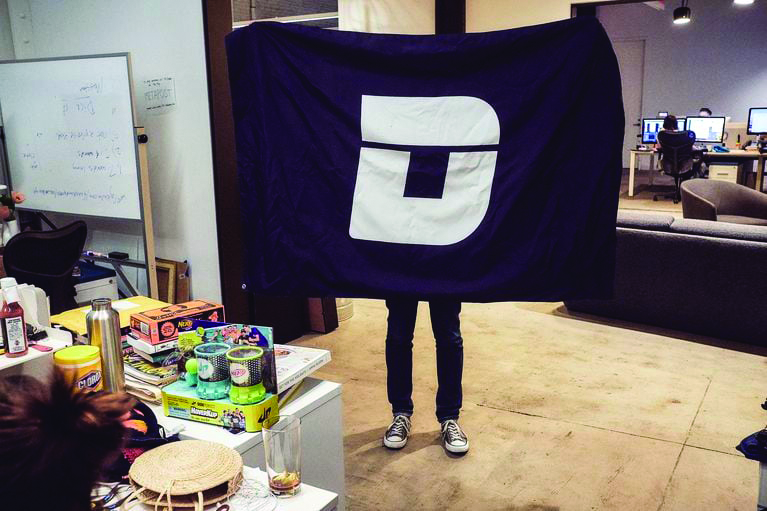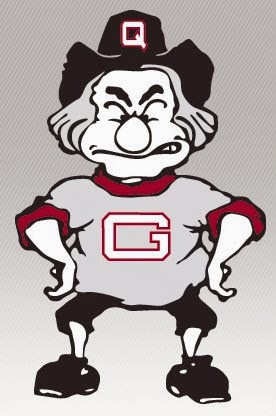Sports site Deadspin reeling after editors leave
A Deadspin employee displyays the site’s logo.
This past week, the popular news website Deadspin has been thrown into chaos. The site, well-known for its sports content, has traditionally allowed writers’ voices and opinions to shine through in their articles, but recent changes in ownership have resulted in the firing and quitting of numerous staff members.
Deadspin is known for its unique tone and specific niche in online news media. The site specializes in sports content, but also provides commentary on a variety of topics, with opinion pieces as well as recent political news. Deadspin features recent articles such as “Dolphins Dent Pursuit of being NFL’s Worst Team, Perhaps Ever” and “40 Questions for the People Who Stand as Soon as the Plane Lands.”
For many, the opinionated takes on popular news stories are what makes Deadspin a favorite news outlet.
“I enjoyed the humorous aspects of their articles, and how they weren’t afraid to call a spade a spade,” said long-time Deadspin reader and Guilford first-year Fenway Donegan. “They struck a good line between being entertaining and informative.”
In April 2019, a private equity company known as Great Hill bought Deadspin and placed Jim Spanfeller as the CEO, according to the Intelligencer, which reports, “Spanfeller quickly laid off G/O’s editorial director, instituted strict office hours and a dress code, and repeatedly made decisions that disrupted Deadspin’s editorial independence — at least in the view of the writers and editors putting out the site every day.”
Spanfeller soon put out a company mandate for the site to “stick to sports.”
In retaliation, editors put out articles that clearly had no relation to sports media, tagging them with the phrase “stick to sports,” which ultimately led to the firing of the deputy editor Barry Petchesky on Oct. 29. He reported in an OpEd for the New York Times that he and his editors “refused to ‘stick to sports,’ because we know that sports is everything, and everything is sports.”
Petchesky’s refusal to bow down was soon followed by the resignation of “all 19 of Deadspin’s editorial employees, and the editorial director of its parent company, G/O Media,” from the Intelligencer.
For many, this marked the death of Deadspin. The site’s unique style may not have attracted too many traditional sports readers, but there was no absence of readership that appreciated Deadspin’s niche.
Guilford first-year Katherine Brown was not surprised to hear about the Deadspin chaos.
“As someone who does not read Deadspin primarily for the sports coverage, I’m rather disappointed,” Brown says. “I think their mix of sports and politics was good. It probably also helped draw readership beyond those interested in sports news.”
Donegan agreed with Brown’s sentiment.
“Deadspin never presented itself as an objective third-party source, which is one of the reasons I liked it so much,” Donegan said.
The blur between sports and politics was a big sticking point for the editors who quit, and Petchesky continues to take a principled stand against Great Hill’s decisions. From his New York Times article, he said “reporting sports with integrity requires knowing that there’s no way to wall off the games from the world outside.”
And it’s true. There is an unmistakable cross-over of sports and politics. Politics and sports don’t only mix at the national level, however: local elections also often incorporate sports policies into their campaigns.
In the town of Oak Ridge, only a fifteen minute drive from Guilford College, the recent town council elections were the most attended in years due to the unofficial campaign aid of the Oak Ridge Youth Association (ORYA), the recreational youth sports agency funded by the town.
President of the ORYA, Tom Collins, advocated strongly for three candidates in defense of the park usage and monetary support of youth sports.
“My reputation is a laid-back dude who tirelessly gives of himself to the families of Oak Ridge, asking nothing in return but the occasional companion at Craft and Vine,” Collins said. “This time I am stepping outside my comfort zone.”
He continued to openly support three candidates and even attracted backlash and attention from other local recreational sports organizations who demanded an apology for his political presence.
This clash of politics and sports is what Deadspin was all about. In fact, the Wikipedia page for the site lists “media, pop culture, and politics” as the main subsections of Deadspin’s articles. As Donegan said, “Imagine the Jackie Robinson bio that only focused on how good of a player he was, instead of the strides that he made within the civil rights community … Taking away relevant outside information only detracts from these stories. No matter the sport, the best moments come from great stories.”
Editor’s note: This story originally was published in Volume 106, Issue 6 of The Guilfordian on Nov. 15 2019.











